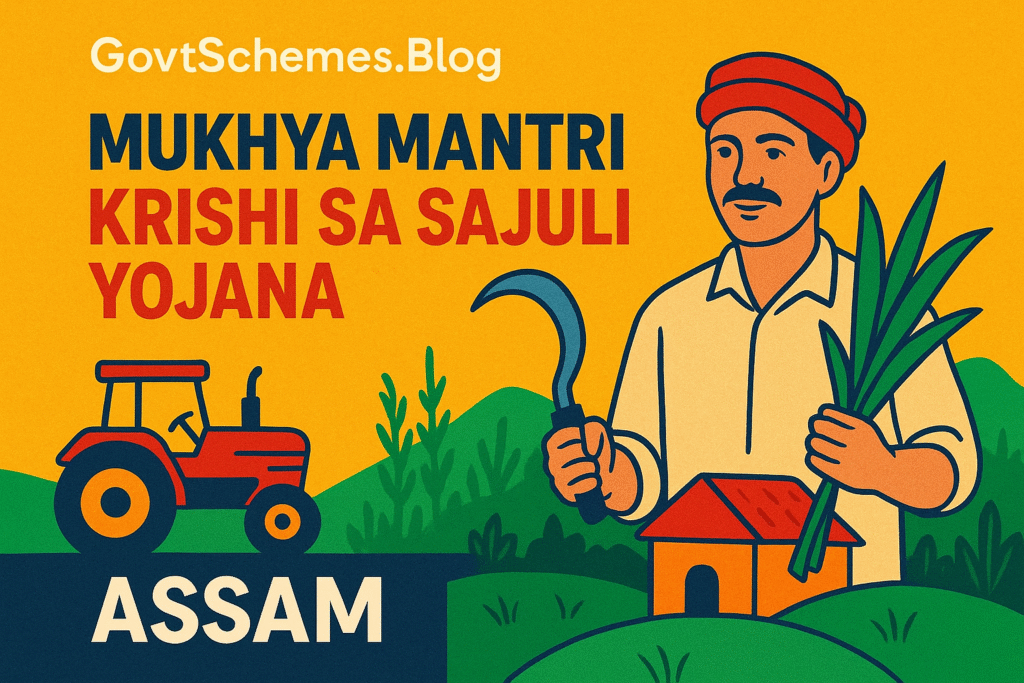Agriculture is the foundation of the Assam economy with more than 70 percent of the population in the state working in agriculture. Irrespective of its importance, low productivity, inadequate mechanisation, frequent floods, and unbroken landholdings are some of the obstacles that have encountered the agricultural sector in Assam.
To adequately solve these problems and empower the small and marginal farmers, the Government of Assam introduced the Mukhya Mantri Krishi Sa Sajuli Yojana (Chief Ministers Farm Tool Scheme) in financial year 201819. This project is intended to foster the mechanisation of farms, boost the crop yield, and secure the income of rural farmers with direct assistance.
What is the Mukhya Mantri Krishi Sa Sajuli Yojana?
The Mukhya Mantri Krishi Sa Sajuli Yojana is a State-Owned Priority Development (SOPD) scheme which stipulates increasing agricultural output by allowing farmers to acquire scientific farm tools and implements.
The Assam Government, under this program, aims to enhance rural livelihoods by encouraging farmers to take up modern agricultural practices as well as provide direct financial assistance to farmers.
Key Objectives
- To promote farm mechanisation and scientific cultivation in rural Assam.
- To increase agricultural productivity and ensure better returns for farmers.
- To provide direct financial support to small and marginal farmers for purchasing farm tools.
- To encourage the use of technology in agricultural practices.
Major Features of the Scheme
- Financial Assistance: Each farmer receives a one-time grant of ₹5,000.
- Target Beneficiaries: The scheme aims to benefit 5 lakh farmers across Assam.
- Purpose of Assistance: Funds are meant exclusively for the procurement of farm tools and implements.
- Direct Benefit Transfer (DBT): The amount is credited directly into beneficiaries’ bank accounts.
- Transparent Selection Process: Beneficiaries are selected by a District Level Committee (DLC) headed by the Deputy Commissioner.
- Monitoring and Supervision: The entire scheme is implemented under the guidance of a State-Level Monitoring Committee chaired by the Agriculture Production Commissioner.
Benefits of the Mukhya Mantri Krishi Sa Sajuli Yojana
- Encourages Farm Mechanisation: Promotes the adoption of modern tools and equipment in farming operations.
- Boosts Productivity: Scientific methods lead to increased crop yield and efficient resource use.
- Saves Time and Labour: Reduces manual labour and speeds up cultivation processes.
- Improves Income: Higher productivity translates to better earnings for small and marginal farmers.
- Promotes Scientific Farming: Facilitates the transfer of technology and innovative practices to farmers’ fields.
Eligibility Criteria
Farmers must meet the following conditions to qualify for the scheme:
- Must be a resident farmer of Assam.
- Only small and marginal farmers are eligible.
- Applicant must be above 21 years of age.
- Should have been engaged in cultivation for at least three consecutive years.
- All Kisan Credit Card (KCC) holders can apply.
- Must possess a live bank account for DBT transfer.
- Only one farmer per family is eligible.
- Tenant farmers or sharecroppers with at least 1 acre / 3 bighas of cultivation area can also apply.
Required Documents
Applicants must keep the following documents ready:
- Aadhaar Card
- Residence Certificate
- Caste Certificate (if applicable)
- Proof of Age
- Agricultural Land Documents
- Bank Account Details
- Ration Card
- Passport-sized Photograph
- Mobile Number
- Signed Undertaking (for tool purchase utilisation)
Application Process
The application process for the Mukhya Mantri Krishi Sa Sajuli Yojana is offline. Farmers can download the application form from the official Agriculture Department website.
Application Forms:
Step-by-Step Process
Step 1: The Agriculture Department publishes advertisements through print and electronic media, inviting applications.
Step 2: Applications are collected by Agriculture Extension Assistants (AEA) along with bank and mobile details.
Step 3: Beneficiaries are shortlisted at the Gaon Panchayat (GP) or Village Defence Party (VDP) level.
Step 4: Lists are compiled and verified by the Agriculture Development Officer (ADO) and submitted to the District Level Committee (DLC).
Step 5: The DLC approves the final list of beneficiaries, ensuring proper representation for SC/ST farmers as per reservation norms.
Step 6: Approved beneficiary data is sent to the Director of Agriculture, who coordinates with ASFAC for fund transfer.
Step 7: Beneficiaries receive the ₹5,000 grant directly into their bank accounts through RTGS/NEFT.
Step 8: Beneficiaries must submit an undertaking confirming that the funds will be used solely for purchasing farm tools.
Step 9: Final beneficiary lists are published on the District Commissioner (DC) websites and displayed on office notice boards.
Reservation Details
As per the state’s reservation policy:
- 7% of beneficiaries will be from the Scheduled Caste (SC) category.
- 10% from Scheduled Tribe (Plains).
- 5% from Scheduled Tribe (Hills).
Frequently Asked Questions (FAQs)
1. What is the main purpose of the Mukhya Mantri Krishi Sa Sajuli Yojana?
To support small and marginal farmers with financial aid to acquire farm implements as well as to advance scientific agriculture.
2. How much assistance is provided?
Direct Benefit transfer of ₹5000 is provided to every qualified farmer.
3. Who can apply for this scheme?
Small or marginal landholder resident farmers of Assam including KCC holders and eligible tenant farmers.
4. How will beneficiaries receive the funds?
The RTGS/NEFT involves transfer of funds into the bank accounts of the beneficiaries.
5. Where can farmers check the list of approved beneficiaries?
The list is posted on the official site of the District Commissioner and put up in the offices of the DC and District Agriculture Officer (DAO).
Conclusion
The Mukhya Mantri Krishi Sa Sajuli Yojana is a progressive step taken by Government of Assam towards empowering farmers by utilizing modern tools and technology to be able to support the agricultural sector. Through facilitating mechanisation of agriculture and direct financial support, the scheme is assisting thousands of small and marginal farmers to increase productivity, conserve labour and gain increased economic stability.
